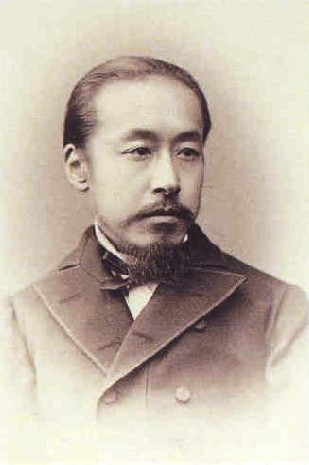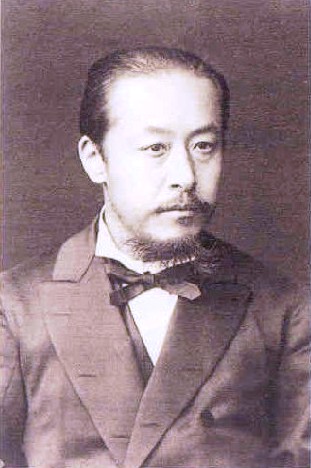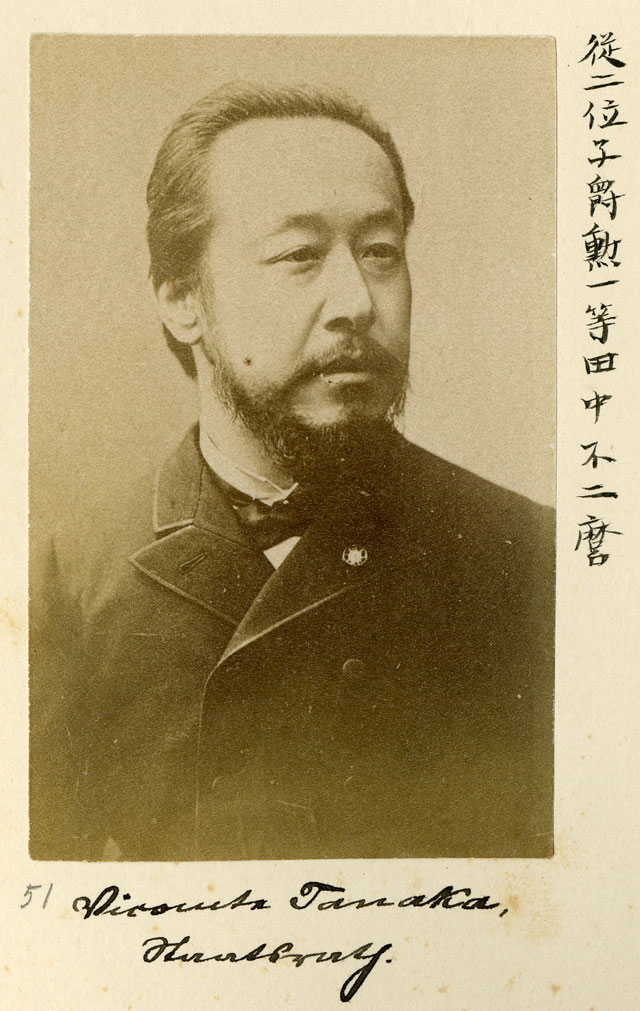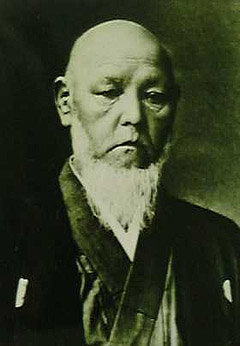<Back to Index>
- Statesman and Educator Tanaka Fujimaro, 1845
- Writer and Politician Tsuda Sen, 1837
PAGE SPONSOR



Tanaka Fujimaro (田中 不二麿, 16 October 1845 – 8 September 1909) was a statesman and educator in Meiji period Japan.
Tanaka was born in Owari Province (present day Aichi Prefecture). After the Meiji Restoration, he was selected to accompany the Iwakura Mission on its around - the - world journey to the United States and Europe. He was especially impressed from what he saw of western educational systems. On his return to Japan in March 1873 (six months earlier than the rest of the Mission), he was made Vice Minister for Education in 1874.
He returned to the United States from 1874 - 1877 for further first hand research on school systems. He spent considerable time at Amherst College and approached Amherst president Julius H. Seelye for advice. He also visited the Centennial Exposition in Philadelphia, after which he submitted a report with photographs to the government. On his return to Japan, Tanaka strongly criticized the Education Order of 1875, which he felt made the system too centralized and inflexible. The new Education Order of 1879 was based on his experiences in the United States, but it quickly came under attack as being confusing and inviting moral decay. Tanaka transferred from the Ministry of Education in 1880 to the Ministry of Justice, and subsequently served in various positions in the Meiji government.

Tsuda Sen (津田 仙, August 6, 1837 – April 24, 1908) was a politician, educator and writer in Meiji period Japan. He was one of the founders of Aoyama Gakuin university, and the father of noted author Tsuda Umeko.
Tsuda was born as the fourth son of a low ranking samurai of Sakura domain in Shimōsa (present day Sakura city, Chiba Prefecture). At the age of 15, he was sent to the domain's school, where he learned English and Dutch, and afterwards was sent to Edo, where he studied rangaku. He was hired by the Tokugawa bakufu as an interpreter, and accompanied Fukuzawa Yukichi on the Kanrin - maru to the United States in 1860.
After the Meiji Restoration, Tsuda joined the new Meiji government, and enthusiastically embraced the rapid westernization drive. He opened the first western style hotel in Tsukiji in 1867, near the foreign settlement. He also spent time with the Hokkaido Colonization Office, where he made close contacts with future Prime Minister Kuroda Kiyotaka. Around this time he developed a strong interest in women's education, and when the revolutionary idea of sending women overseas as exchange students with the Iwakura Mission, he quickly volunteered his daughter Umeko. Tsuda also influenced the creation of the Friends School, a women's junior and senior high school established in 1887 in Tokyo.
In 1873 Tsuda attended the Vienna Expo, where he met Sano Tsunetami (founder of the Japanese Red Cross), and where he received a lesson on Western agricultural techniques, particularly artificial crop pollination. After returning to Japan in May 1874, he opened the Gakunosha Nogakko (Gakunosha School of Agriculture) in Azabu, Tokyo, and worked to introduce and promote Western vegetables (particularly corn) and fruits. He initially sold the corn by mail advertisement, and is thus also the first such entrepreneur in Japan. He also established a magazine, Nogyo Zasshi, aimed at the agricultural market. Around this time, it is believed that he also converted to Christianity, and he later became a strong temperance campaigner.
A supporter of agrarian rights, he was involved in the Ashio Copper Mine Scandal, one of Japan's first environmental disputes.
Tsuda also played an important role in establishing Christian schools, such as Aoyama Gakuin, Doshisha University, Friend's Girl's School and Tokyo School for the Blind and Deaf (currently the Tsukuba Daigaku Fuzoku Mougakko). He was involved in most of the work to create the early foundation of Aoyama Gakuin.
He died on the Tokaido line train of a cerebral hemorrhage, and his funeral was held in the auditorium of Aoyama Gakuin, and his grave is at Aoyama Cemetery.